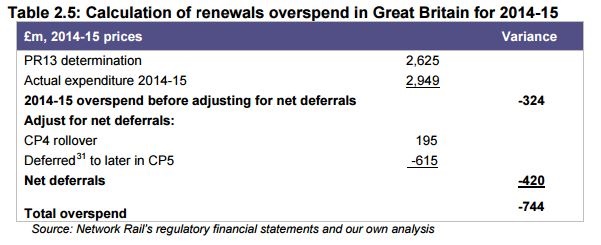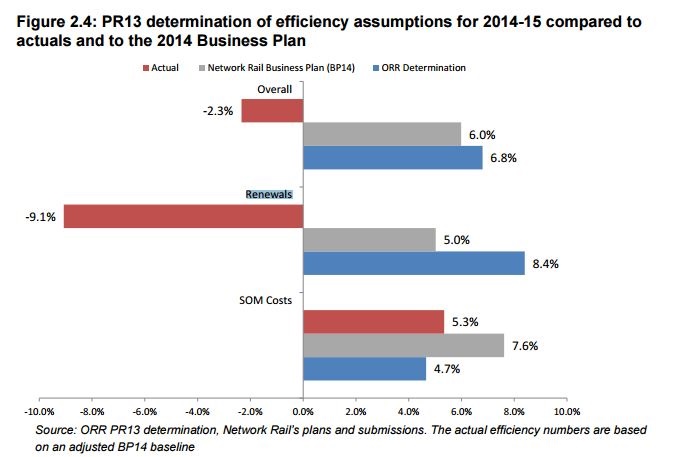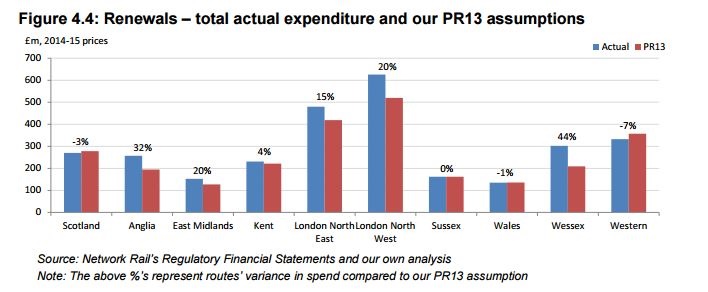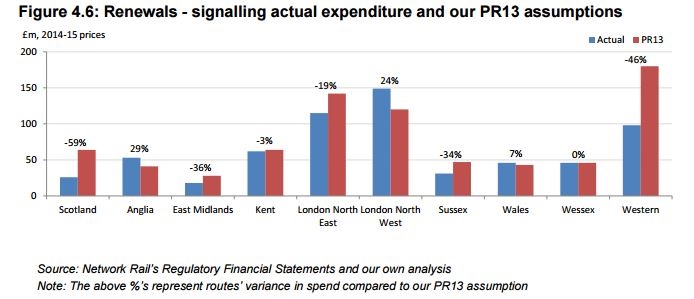20.10.15
NR overspending on renewals but delivers ‘less than expected’
Network Rail spent £324m (12%) more on renewals during 2014-15 than the ORR signed off on, but has delivered “less than expected”.
In its ‘Annual efficiency and finance assessment of Network Rail 2014-15’ report, the ORR (Office of Rail & Road) said that higher renewals cost were the main reason for driving up Network Rail’s total expenditure to £10.2bn – £148m (1.5%) higher than the PR13 financial assumption.
The renewals overspend came despite deferring renewals work of a net £420m to later in CP5.
“This significant overspend of £744m was largely due to higher unit costs on assets such as track and signalling, where there were some supply chain issues,” said the ORR.

It was noted that renewals financial underperformance* of £186m was affected in track (£86m) due to unit costs being “adversely affected by technical problems with new high output equipment” and cost impacts from changes to the procurement framework.
Signalling, which saw a £37m underperformance, was affected by cost increases and added scope for certain large schemes such as Watford, Wolverhampton, Cardiff and Bristol. And in civils (£22m) there were cost overruns on a number of projects, including additional costs resulting from “adverse weather events”.
Maintenance underperformance stood at £79m, which included £37m on the Tidy Railway programme to reduce litter; and schedule 8 payments to train operators were £105m higher than assumed.
Enhancements underperformance was £47m mainly due to Thameslink (London Bridge) and increasing costs on the Great Western electrification programme, Birmingham New Street and West Coast Power Supply upgrade.
In 2014-15 Network Rail’s support, operations, maintenance and renewals efficiency deteriorated by 2.3% overall. This was largely driven by the rising cost of renewals, which pushed renewals efficiency down by 9.1%.

Six routes spent more than the ORR assumed in PR13 and four routes spent the same or less. In percentage terms the Anglia and Wessex routes had the largest variances compared to PR13 due to overspends on track and civils, and also on signalling for the Anglia route.
The largest routes, London North East (LNE) and London North West (LNW), also had significant variances mainly on track and also signalling for LNW. Scotland and Western spent less than the ORR’s assumption, but this was due to deferrals of particularly large signalling projects on these routes.

On track renewals, the largest variances were in the East Midlands and LNW and LNE routes. In East Midlands off-track works costs were higher than expected in order to maintain asset quality and functionality. In LNW the variance was due to “expected contractor savings not materialising, planned efficiencies from improved working practices not yet yielding the benefits it expected and costs on the Watford re-signalling programme were higher than anticipated”.
In seven routes civils renewals were higher than the ORR’s PR13 assumptions and in three routes civils renewals expenditure was below our PR13 assumptions.

During the period, Network Rail spent £2.919bn on enhancements to the network, which was £64m less than the ORR’s estimates. However, the determination was a provisional sum because a number of projects were at an early stage of development at that time.
The ORR added that looking ahead to the remainder of CP5, there are “considerable affordability challenges” for Network Rail on enhancements.
“For example, we have only completed Enhancement Cost Adjustment Mechanism (ECAM) reviews on some 50% of the current ECAM portfolio (by SBP value), but the efficient funding we have determined already adds up to about 80% of the total assumed in the determination,” it noted.
Due to the significant number of enhancements milestones missed so far this control period, the ORR decided that Network Rail is in breach of its licence. However, as reported last week by RTM, the regulator has concluded that the company is already “taking action” to improve the planning and delivery of its CP5 enhancements programme.
* Financial performance compares Network Rail’s income and expenditure to the PR13 determination. If Network Rail can demonstrate that it has spent less whilst delivering its outputs then it can claim financial outperformance. Network Rail needs to show that it has not spent less by non-delivery of outputs or by simply deferring work or working in an unsafe or unsustainable way. If it spends more it is financially underperforming. This measure has replaced Financial Value Added (FVA), which was used in CP4. (Source: ORR)